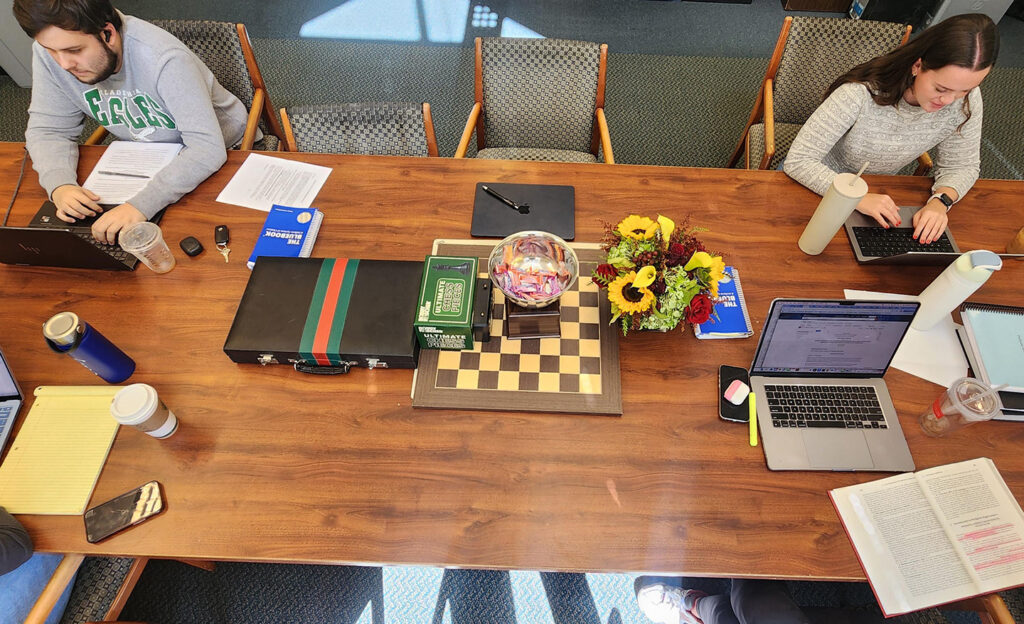On a recent day, backgammon, chess sets, and a pile of Bluebooks covered the table where students traded banter and advice in their preparation to assist unrepresented clients facing legal battles as part of BC Law’s new Pro Se Legal Assistance Clinic. Thanks to a grant from the United States District Court for the District of Massachusetts, BC Law Professor Jeffrey Cohen launched the clinic at the Law School to support pro se litigants navigating federal civil cases in the federal court.
Gathered in their campus office, students filled the air with questions about subject matter jurisdiction and the statute of limitations, along with laughter, a few groans, and various court updates. In his adjoining office, Cohen, a former Assistant US Attorney in the District of Massachusetts, fielded student questions while preparing for their official class session later that day.
The clinic’s nine students are already dealing with more than 40 clients—a number that’s growing steadily each week and is an indicator of the clinic’s importance. “The response has been tremendous from the school, the legal community, and the courts,” Cohen said. “There is a big need for this program.”
The need became evident from day one, said 3L Sarah Kaplan, noting that the group’s very first class meeting was interrupted by a phone call from a client seeking legal help. The phone hasn’t stopped ringing since.
“It’s completely different from what I expected,” said classmate Lizzie Russell. Coming into the clinic thinking that it would be mostly legal writing and research, she was surprised to find that the work stretched beyond filing claims to requiring soft skills like client counseling. “You’re talking to people who have never set foot in a courthouse before,” Russell explained.
Cohen divides the students into pairs and assigns them clients who come to the clinic in all stages of their legal proceedings. Most find their way through the clerk’s offices in each of the three federal courthouses, which advertise the pro se clinic’s services. Although the clinic does have its own office in the federal courthouse in downtown Boston, Cohen and his students have found that Zoom or online meetings are often the most effective way to stay in contact with their clients.
Andrew Pfeifer ’26 had just spent his morning watching a client’s court proceedings via Zoom. Whenever possible, however, Cohen works to make sure the students are able to attend various court proceedings—not only those for their own clients. As the program progresses, Cohen hopes the students won’t only be helping outside of the courtroom. “My hope is that the clinic will evolve to allow students to get up and argue in federal court.”
The clinic tackles a wide range of matters, including civil rights claims, First Amendment issues, disability act violations, retaliation under the Fair Housing Act, and child custody cases. Students’ work often involves drafting complaints, responding to motions, writing letters to opposing counsel, and assisting with discovery. They walk their clients through each step of the process, from advising them on when—or when not—to file a claim to helping them determine how to take someone to court. “We’re generally in the business of helping people solve their problems,” Kaplan said. “The problems are often legal, but the solution isn’t always in front of a court.”
The clinic teaches students how to shift from the classroom lessons of issue-spotting to the courtroom realities of litigation. “It’s not about poking holes, it’s about advocacy,” Pfeifer said. Although clients may arrive unrepresented, they don’t always remain that way. One of Pfeifer’s clients recently retained an attorney, but as he explained, part of the mission of the clinic is to put people in a successful position where a lawyer can step in and start running with it and not have to waste time digging the client out of holes.
For Cohen, one of the most rewarding parts of the program has been the reactions of their clients and how appreciative they are to talk to someone who will listen to them, vindicate their rights, and understand what they’re going through. As Kaplan put it, “It’s the first time some people have had someone look at them and say, ‘I believe you.’”
The work itself varies day to day, week to week. “A client will call with a deadline they forgot to tell you about. One week it might be 30 hours of work, then others a lot less,” Russell said. Whatever the task, Cohen knows his “amazing group of students” will rise to the challenge. His goal is for them to understand how civil litigation happens and to experience all aspects of civil proceedings in court, shepherding the students but also stepping back to allow them to make decisions on their own. “I want to make sure the students feel empowered,” he explained.
Clients come from all across the state, both plaintiffs and defendants, and the clinic seeks to help them all. “We haven’t found our max capacity yet,” Cohen said. “We’ll keep pushing until we do.”
Photograph by Alyssa Hatfield ’26


